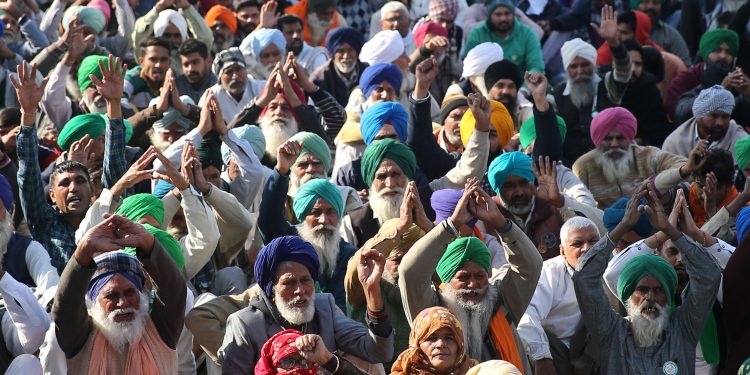To roll back or not to roll back! This is the question that could be occupying uppermost mind space of the Union government now. It concerns the three new controversial farming related laws. The Modi government needs to address this imbroglio without any further delay. Time is running out. Unlike the Supreme Court which can afford to bide time to take a decision, a democratically elected government does not enjoy that luxury. The farmers’ agitation against the legislations has engulfed the executive, the judiciary, the Opposition and the corporate world while getting international traction. The big private houses that incurred the wrath of the farmers having been perceived to be the main beneficiaries of the new laws, have become unnerved. One of them has launched a media propaganda blitzkrieg through advertisements to counter the farmers’ charge against it. Another has begun an almost internecine war in the corporate world accusing its rivals of colluding with the agitating farmers who have given a call to boycott its telecom services, as it is also an agriculture market leader. This has started to hit the company’s telephony business with over 400 million subscribers. The rivals, of course, denied the charge and claimed they have been in the telecom business for the past 25 years and captured the market through hard work.
Nobel Laureate Abhijit Vinayak Banerjee has recently said that the farmers’ agitation has been spurred on not so much for the content of the new laws but because of massive lack of trust in the government. He further says this time of the pandemic is not good to have a conversation about the farm laws and that the government should immediately announce a temporary rollback and discuss the legislations at length in the Parliament later on. Although Banerjee’s opinion may be valid, no one will be deceived that Parliamentary debates in India must not have the last say to pave the way for resolution of such conflicts. Banerjee’s suggestion could sound like a sweet melody to this government which has become extremely deft at misusing the discuss-debate-decide mode of Parliament. It is we, the people, the lowest in the economic rung, who have given an overwhelming majority to the BJP in the last general election. With such a huge number of MPs on its side, any discussion on the floor of the House becomes redundant once the matter, at the finale, goes for voting. If the Bills come up for voting once again, the ‘Ayes Have It, Ayes Have It’ will ring loud and clear from the Speaker’s Chair. Once that is done, the farmers would never understand what hit them. Most uneducated democrats would then stand aside and feel proud that the test of fire was duly undertaken and the law was passed properly. That lie would be a true deception. Apart from the farce being played out on India’s democracy currently, Banerjee does not seem to realize that it is not just ‘massive mistrust in the government’ that is encouraging the farmers to protest but also that the three laws are going to be very harmful for India’s agriculture sector in the days to come. Banerjee, in an unspoken fashion, has not opposed the laws per se but finds superficial fault because of the timing of implementation.
Till now the government is in no mood to budge from its stand that the laws will be a “game-changer.” After maintaining silence for some time and letting his Cabinet colleagues defend the legislations, Prime Minister Modi has now begun to bat for the farm laws with an appeal to the Opposition to support the measures and not to “mislead” the farmers. This is usual political rhetoric and slugfest between the ruling party and the Opposition to upstage one another to consolidate respective vote-banks. Now, it is for the Opposition to withdraw and not try to usurp this people’s movement for its own benefit. Trying to do so would only help the government.
Not long ago, the country was witness to a similar turmoil when farmers closed ranks and took on state power which, like the Modi government, tried its best to sell the idea to the farmers that its initiative was in their interests only. Nearly a decade ago, the CPM government in Bengal began a major industrialisation overdrive by forcibly taking away farmland. Like the BJP, it was also a regimented party enjoying overwhelming majority in the state Assembly and it tried to steamroll farmers’ agitation spearheaded by the Trinamool Congress. The then Chief Minister Buddhadeb Bhattacharjee had boasted with the infamous remark, “we are 235, they are 35,” referring to the respective tallies of the Left Front and the Trinamool in the Assembly. A minister of the Modi government parroted a similar argument in a slightly different language bragging that the government has comfortable majority in the Parliament and a “ragtag” farmers’ group doesn’t have the power to stop the government from having its way.
It was the arrogance and desperation to placate the corporate lobby that propelled the Marxist government to try and bulldoze farmers’ protest with the power of brute legislative majority and well-oiled party machinery. What happened thereafter is history. The Marxists got voted out by the people in 2011. Since then they have been suffering the ignominy of being an also-ran outfit in successive elections that they have contested.
What the BJP government at the Centre has now embarked upon is being viewed as far more alarming for the farmers and the country’s food security. The ruling party first tried to denigrate the agitation by portraying it as a Khalistani-inspired movement, the work of anti-nationals, turban naxals and vested interests. Meanwhile, the Supreme Court too has spoken, defending the farmers’ right to protest peacefully while it has also sought the government’s opinion on how, in future, such protests should be held against the government. The government is still adamant and unwilling to concede to the farmers’ demand to withdraw the legislations completely. That, the BJP leadership feels, could mean a major blow to its standing in the people’s eye and the interests of its friends in the corporate world. It’s time it learns a lesson from the fate of the Marxist government in Bengal rubbing the farmers the wrong way.







































